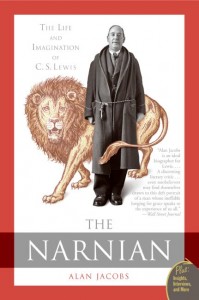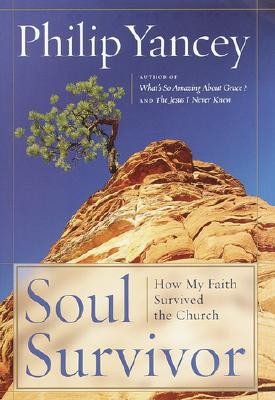The Narnian
 Alan Jacobs’s The Narnian: The Life and Imagination of C.S. Lewis has been recommended to me twice by commenters here. I’ve been working through it slowly and savoring its even-handed, discerning discussion of this much-loved writer. Jacobs tells the story of Lewis’s life with respect for its complexity and, for the most part, a willingness to acknowledge its mystery.
Alan Jacobs’s The Narnian: The Life and Imagination of C.S. Lewis has been recommended to me twice by commenters here. I’ve been working through it slowly and savoring its even-handed, discerning discussion of this much-loved writer. Jacobs tells the story of Lewis’s life with respect for its complexity and, for the most part, a willingness to acknowledge its mystery.
Over the course of the book Jacobs discusses a number of themes that run through Lewis’s thought and work: science and magic, joy, re-enchanting the world, cultural memory, suffering, and faith. He explores questions: why did Lewis turn to the writing of children’s stories? How did he see his role as a Christian writer, and how did his view of his own efforts at Christian apologetics change? How did his books reflect his main concerns, and how do those themes develop over time? I close the book even more aware than before of how Lewis’s life seems to repel all the expected stereotypes.
I was familiar with Lewis’s basic biography through books like Colin Duriez’s Tolkien and C.S. Lewis, Laura Miller’s The Magician’s Book, and The Life of C.S. Lewis. I learned much that was new to me in this book, and I appreciated the depth of insight and thoughtfulness Jacobs brought to bear on the subjects I already knew about, such as Lewis’s relationships with his father, Janie Moore, and J.R.R. Tolkien. Each of these relationships bore its share of suffering, and Jacobs wrote of them with compassion as well as a respect for the limits of what is actually known. I learned about any number of other friendships too, as well as Lewis’s astonishing correspondence. I couldn’t help but reflect on what a treasure trove Lewis’s letters are — to his family, to his friends, even on occasion to his fans.
I knew that Lewis wrote faithfully to his fans, answering every letter because he believed that once a writer puts his thoughts out there for public consumption, he remains responsible for them. But I didn’t know that many of these letters were from women simply complaining about their lives. I didn’t know that not one, but two, women set themselves up as his fiancee. (He hadn’t met either of them.) In fact, the only correspondent he stopped answering was a woman who believed his books were all love letters to her, written in code.
Jacobs’s remarks about Lewis’s books are engaging. He discusses them according to theme, rather than according to book. I couldn’t help but remember the comment of a British man I met last year who, when Lewis’s name came up, dismissed him as “merely clever.” Surely the man who read every single 16th-century book in the Bodleian library, and then wrote a scholarly book about it that sent shock waves through academia, was more than merely “clever.” Lewis was more well-read and learned at 17 than most of us will ever be. I found it interesting that in the grief-stricken and physically exhausted period after Joy Davidman’s death, concurrently with A Grief Observed, Lewis’s last “polemic” book was a work of literary criticism defending diverse reading: An Experiment In Criticism, a book I need to read.
One book I see that I’m going to have to reread: Lewis’s later novel Till We Have Faces. I’ve read it twice, not liking it very much either time. I think it’s because it has such a different narrative voice than Lewis’s other books — it lacks the voice Lewis might have described as his “expository demon,” maybe — and so when I read it I missed Lewis. But reading Jacobs’s comments about the novel as a working out of Lewis’s ideas on the division between words/argument, and the real cry of the heart, intrigued me enough to want to read it again.
Jacobs addresses the accusation of misogyny sometimes levelled at Lewis, and for the first time I understood it (though I still don’t agree with it). He takes issue with other biographers at various points, most notably A.N. Wilson, as well as other critics, and I found myself trusting Jacobs’s perspective as he defined his views in relation to these others. The only section I didn’t buy was in his discussion of Lewis’s marriage to Joy Davidman, where he expresses skepticism about Lewis’s account of the progression his feelings. It’s clear that both of Lewis’s main adult relationships with women — Janie Moore and Joy Davidman — were unorthodox. It doesn’t seem fair to compare his feelings to what we might expect or consider to be common.
This biography does justice to its subject, informing us and plumbing the depths of a life that shows the transforming power of “mere Christianity” on intellect and heart. In fact, I enjoyed reading it so much that I want to read another Alan Jacobs book, A Theology of Reading.


